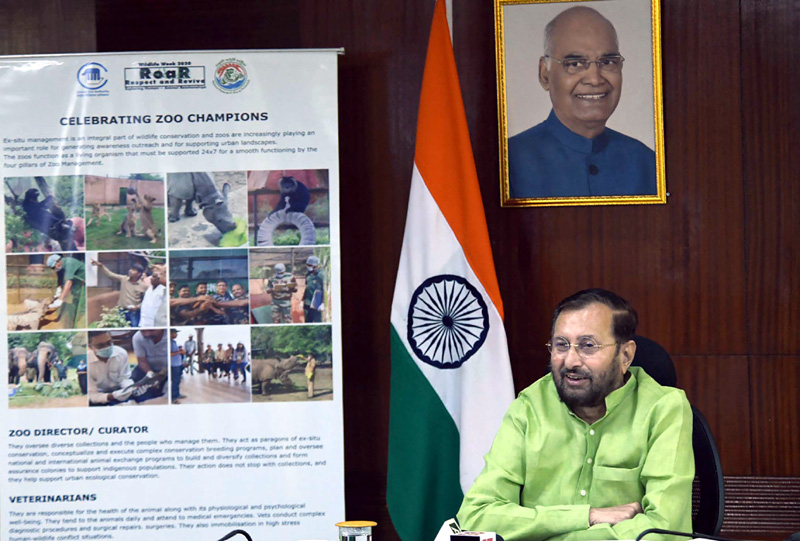
NEW DELHI, Oct 5: The Government will come up with a plan to improve and expand zoos in the country through Public-Private Partnership, Union Environment Minister Prakash Javadekar said on Monday.
Speaking at an online event ‘Wildlife Week 2020’, he said that funds will be allocated for the plan and it will be announced in the budget session next year.
“Children like visiting zoos and to enhance their experience, these facilities must be maintained properly. There are 160 zoos in the country. We will soon come up with a new plan for upgradation and expansion of zoos across the country and we will set aside a budget for it, which will be announced in the next year’s budget session,” Javadekar said.
The Minister said that State Governments and corporations will also be involved in this plan.
During the online event, Javadekar also released a report based on the total economic valuation of the Delhi National Zoological Park. The report was prepared by by The Energy and Resources Institute (TERI) and the Central Zoo Authority (CZA).
The total economic value of ecosystem services provided by Delhi’s National Zoological Park for 2019-2020 stood at Rs 422.76 crore, according to the report. The ecosystem services provided by the zoological park are bio-diversity conservation, carbon storage and sequestration, employment generation, education and research, and recreational and cultural. The report stated that 77 per cent of the Rs 422.76 crore came from recreational and cultural services, and the amount stood at Rs 324.33 crore.
Education and research services contributed nine per cent or Rs 37.60 crore to the total economic value.
While employment generation contributed eight per cent or Rs 32.19 crore, the contribution of bio-diversity was six per cent or Rs 27.33 crore.
The least contribution was found in carbon sequestration which was 0.31 per cent or Rs 1.31 crore of the total economic value of ecosystem services provided by the Delhi zoo in 2019-2020.
“Irrespective of the contributions, every service is important as it contributes towards the improvement of the local environment. The benefits of the zoo are not only restricted to its visitors but also reach Delhi’s citizens. Hence, it is necessary to ensure proper maintenance of the zoo to improve its services,” the report stated.
Zoological parks in India are unique ecosystems that provide numerous services of local and national significance. Besides their primary function in education and research, many zoos serve as natural habitats for free-ranging animals.
“Moreover, such parks are sources of carbon sequestration, air purification, water purification, noise attenuation etc,” the report said.
Spread across 176 acres, the National Zoological Park in Delhi is home to several species of mammals, birds and reptiles.
“As of 2018, there are 40 species of endangered animals under Schedule I and II categories; 35 species of animals under Schedule III and IV categories; and 29 species of exotic animals as specified under the Indian Wildlife (Protection) Act, 1972. Apart from enclosures for wild animals and administrative buildings, the zoo sustains a natural environment in its campus which provides habitat for several free-ranging floral and faunal species,” the report said. (PTI)

